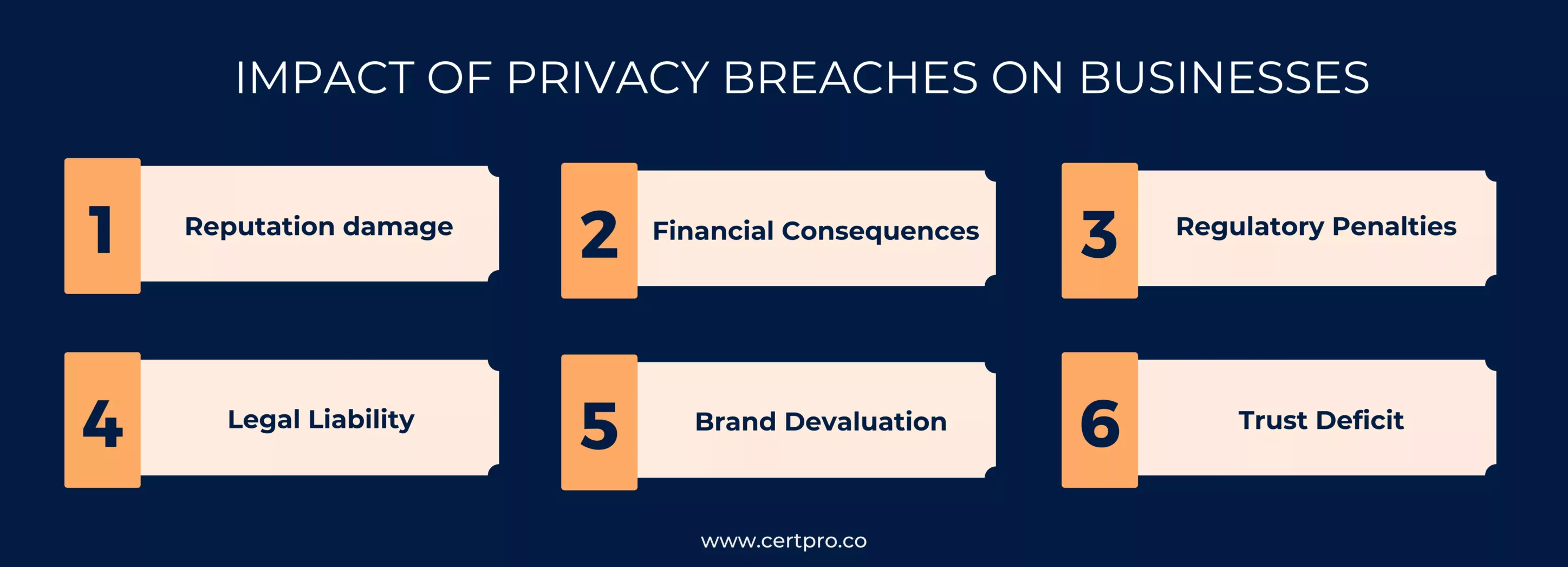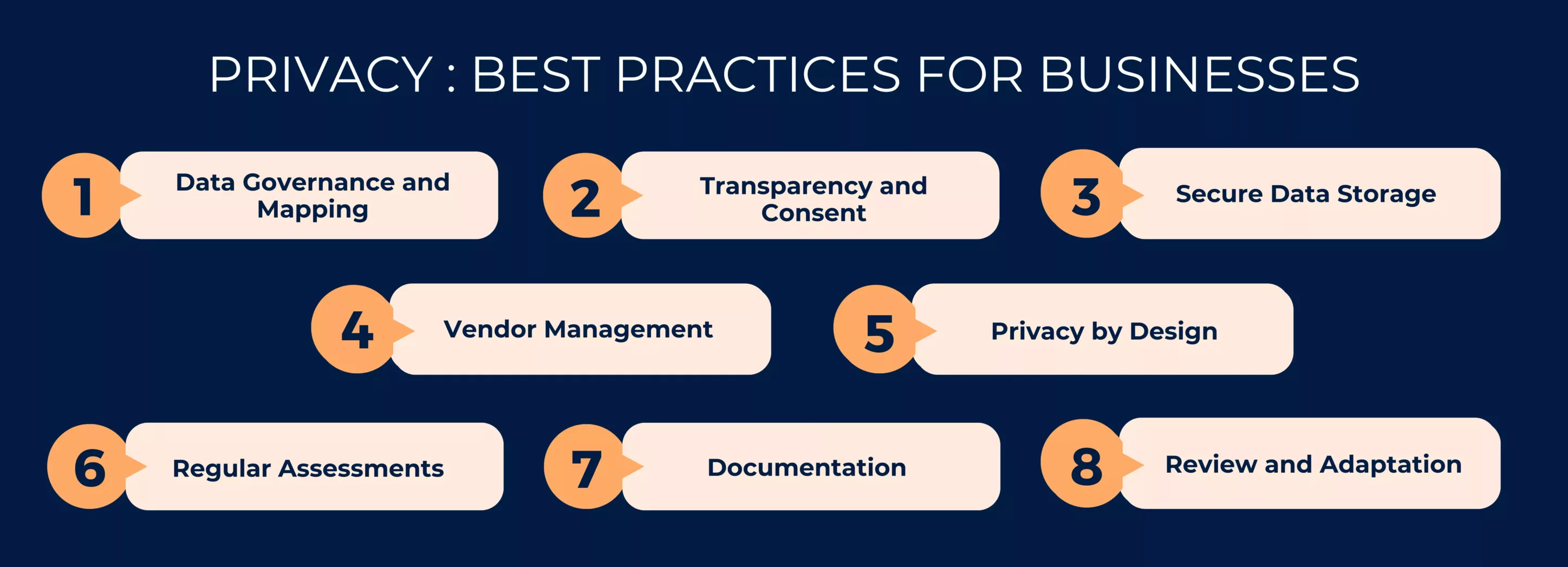In today’s hyper-connected and data-driven business landscape, the imperative to manage privacy in business has emerged as a paramount concern. As companies leverage technological advancements to innovate and compete, they simultaneously gather an unprecedented volume of sensitive information from customers, employees, and partners. This digital transformation brings unparalleled opportunities but also ushers in an era of heightened privacy challenges.
As businesses collect and process vast amounts of personal and sensitive data, concerns surrounding data privacy in business breaches, cyber threats, and regulatory compliance have come to the forefront. The introduction of stringent privacy regulations like the GDPR and the CCPA has placed increased emphasis on safeguarding individuals’ personal information.
At the heart of the matter lies the critical relationship between privacy management and maintaining trust. Consumers are more discerning than ever about how their data is handled, demanding transparency, security, and control. Thus, the ability to manage privacy effectively has become not just a best practice but a strategic necessity for businesses seeking to thrive in the digital era.
This article delves into the multifaceted aspects of privacy management that businesses must navigate, exploring its significance, challenges, regulatory landscapes, and best practices to ensure a secure and trustworthy future.
DATA PRIVACY’S RISING RELEVANCE FOR BUSINESSES
In the business context, privacy refers to the protection and responsible handling of personal and sensitive information collected from customers, employees, partners, and other individuals. It involves maintaining the confidentiality, integrity, and security of this data while respecting individuals’ rights to control and manage their own information. Privacy in business encompasses measures, policies, and practices aimed at preventing unauthorized access, data breaches, and misuse of personal data. It ensures that individuals’ privacy rights are upheld and that their information is treated with the utmost respect and ethical consideration within the context of data privacy in business operations.
In the digital age, where data privacy in business has become a driving force of innovation and business operations, privacy management has gained unprecedented importance.
The Significance of Privacy Safeguarding in the Digital Era:
1. Regulatory Compliance: Governments worldwide have introduced stringent privacy regulations like the General Data Protection Regulation (GDPR) and the California Consumer Privacy Act (CCPA).
2. Consumer Trust: Breaches of privacy can lead to the erosion of consumer trust. By demonstrating a commitment to safeguarding personal data, companies can build trust with their customers, fostering loyalty and long-term relationships.
3. Data Security: The increasing frequency and sophistication of cyberattacks highlight the need for robust privacy management. Effective data protection measures not only safeguard sensitive information but also prevent financial losses and reputational damage.
4. Competitive Advantage: Privacy-conscious consumers prefer to engage with businesses that prioritize privacy. Implementing effective privacy management practices can differentiate a business from its competitors and attract privacy-conscious customers.
5. Globalization: Businesses operate in a global environment, necessitating compliance with various regulations across jurisdictions.
In conclusion, privacy management has evolved into a critical business imperative in the digital age. Businesses that prioritize privacy in business not only fulfill legal obligations but also build trust, protect sensitive information, and maintain ethical standards.
IMPACT OF PRIVACY BREACHES ON BUSINESSES
It has a profound impact on businesses, encompassing far-reaching consequences that extend beyond immediate financial losses. These breaches occur when personal or sensitive information is exposed, accessed, or used without authorization, potentially leading to significant harm to both individuals and the affected organization.
The key impacts of privacy breaches include:
1. Reputation damage: It erodes trust and credibility. News of a breach can spread quickly, leading to negative media coverage, social media backlash, and a loss of customer confidence.
2. Financial Consequences: It entails financial burdens. The costs associated with breach response, including forensic investigations, legal Fees, notifying affected parties, and potential regulatory fines, can be substantial.
3. Regulatory Penalties: Many jurisdictions have stringent regulations, such as the GDPR and CCPA, with provisions for significant fines for non-compliance. It can trigger regulatory investigations and penalties, impacting a company’s bottom line and public image.
4. Legal Liability: Businesses that fail to adequately protect personal data may face legal action from affected individuals. Lawsuits can lead to significant financial settlements, legal fees, and further reputational damage.
5. Brand Devaluation: It can stain a brand’s reputation, affecting brand loyalty and equity. The negative association can linger, influencing perceptions of the company’s values and commitment to security.
6. Trust Deficit: Businesses rely on trust from customers, partners, and investors. A breach undermines this trust, affecting partnerships, collaborations, and investment opportunities.
Privacy breaches have wide-ranging and severe consequences for businesses. The financial, reputational, legal, and operational impacts underscore the critical importance of robust data protection measures and proactive privacy management strategies.

REGULATORY FRAMEWORKS IN BUSINESSES PRIVACY
Regulatory frameworks in business play a pivotal role in shaping how organizations handle data privacy. These frameworks consist of laws, regulations, and guidelines established by governments and regulatory bodies to ensure that businesses collect, process, and manage personal data responsibly and ethically. These frameworks outline the standards and practices that businesses must adhere to when dealing with personal and sensitive information.
Examples of significant regulatory frameworks include:
1. General Data Protection Regulation (GDPR): The European Union enforces a comprehensive data protection policy that dictates how enterprises should manage the personal data of EU citizens. It emphasizes the importance of obtaining informed consent, providing data subjects with access to their information, and implementing robust security measures to prevent data breaches.
2. California Consumer Privacy Act (CCPA): This Californian law grants consumers the right to know what personal information is being collected, how it’s used, and how to opt out of data sales. It highlights the importance of transparency and gives individuals more control over their data.
3. Health Insurance Portability and Accountability Act (HIPAA): HIPAA sets stringent privacy and security standards for protecting patients’ medical and health-related information. It applies to healthcare providers, insurers, and their business associates.
4. Personal Information Protection and Electronic Documents Act (PIPEDA): In Canada, PIPEDA governs how private sector organizations handle personal information. It focuses on consent, data accuracy, security, and individuals’ access to their data.
These regulatory frameworks have a profound impact on businesses. Compliance with these laws is not only a legal obligation but also a means to establish and maintain trust with customers and stakeholders. Non-compliance can result in severe financial penalties, legal actions, and reputational damage. Businesses must establish privacy policies, implement data protection measures, and educate their employees about privacy.
PRIVACY : BEST PRACTICES FOR BUSINESSES
Privacy best practices are fundamental guidelines that businesses must follow to ensure the responsible and ethical handling of personal and sensitive information. Implementing these practices is essential for maintaining customer trust, complying with regulations, and safeguarding sensitive data from unauthorized access and breaches.
Some key privacy best practices for businesses:
- Data Governance and Mapping: Begin by understanding the data you collect, process, and store. Maintain a comprehensive data inventory that details the types of data you handle and where it resides within your systems.
- Transparency and Consent: Clearly communicate to individuals why their data is being collected and how it will be used. Obtain explicit consent for data collection and ensure individuals understand their rights regarding their information.
- Secure Data Storage: Implement robust security measures to protect data at rest and in transit. Utilize encryption, access controls, and regular security audits to prevent unauthorized access.
- Vendor Management: If you share data with third-party vendors or partners, ensure they adhere to similar privacy standards. Verify their data protection practices and sign data processing agreements when necessary.
- Privacy by Design: Incorporate privacy considerations into your business processes, products, and services from the initial design phase. This ensures that privacy is a core aspect of your offerings.
- Regular Assessments: Conduct regular privacy assessments to identify vulnerabilities, address risks, and ensure ongoing compliance with privacy.
- Documentation: Maintain records of your privacy practices, policies, assessments, and employee training. Proper documentation showcases your commitment to data privacy and can be useful in demonstrating compliance.
- Review and Adaptation: Stay informed about changing privacy laws and industry standards. Regularly review and update your privacy practices to align with new requirements.
By adhering to these privacy best practices, businesses can establish themselves as trustworthy custodians of personal data, foster customer loyalty, and enhance their reputation.

NAVIGATING PRIVACY IN BUSINESS
As technology reshapes industries, businesses are tasked with responsibly handling personal data. This dual role underscores the essential nature of effective privacy management. Elevated concerns regarding data breaches, cyber threats, and stringent regulations like GDPR and CCPA highlight the intrinsic link between privacy management and maintaining trust. By prioritizing transparency, security, and compliance, businesses can forge lasting relationships with stakeholders.
Privacy management extends beyond compliance; it’s a strategic advantage. Businesses that emphasize privacy cultivate loyalty, gain a competitive edge, and bolster their reputation. Adhering to regulatory frameworks ensures ethical data practices, and privacy best practices offer practical guidance.
In conclusion, privacy management is integral to business success.
FAQ
WHY IS PRIVACY MANAGEMENT IMPORTANT IN THE DIGITAL AGE?
In the digital age, businesses collect vast amounts of data, making effective privacy management crucial. It helps maintain customer trust, comply with regulations like GDPR and CCPA, and prevent data breaches.
WHAT ARE THE IMPACTS OF BREACHES OF PRIVACY ON BUSINESSES?
Breaches of privacy can lead to reputational damage, legal consequences, loss of customer trust, and financial penalties, impacting a business’s credibility, operations, and bottom line.
WHAT ARE THE REGULATORY FRAMEWORKS FOR BUSINESS PRIVACY?
Prominent regulatory frameworks include GDPR (EU), CCPA (California), LGPD (Brazil), APPI (Japan), and PIPEDA (Canada). These frameworks govern data collection, processing, and user rights to protect business privacy.
HOW CAN BUSINESSES ENSURE PRIVACY BY USING BEST PRACTICES?
Businesses can ensure privacy best practices by transparently communicating data usage, obtaining consent, implementing data security measures, training employees, and conducting regular assessments.
WHY IS TRANSPARENCY ESSENTIAL FOR BUSINESS DATA PRIVACY?
Transparency fosters trust between businesses and customers. Clearly communicating how data will be used and obtaining informed consent demonstrate respect for individuals’ privacy.

About the Author
NICOLENE KRUGER
Nicolene Kruger, Regional Manager in South Africa, is an experienced Legal Counsel with expertise in compliance and auditing. Her strategic, solution-driven approach aligns legal standards with business objectives, ensuring seamless adherence to regulations.
HOW DOES THE NIST CYBERSECURITY FRAMEWORK FUNCTION, AND WHY IS IT IMPORTANT?
Emerging cyber threats make cybersecurity an essential consideration for organizations handling and managing data. In this regard, the NIST cybersecurity framework applies to improving your cybersecurity program. It is a set of guidelines that helps improve your...
UNDERSTANDING ISO 42001: A GUIDE FOR RESPONSIBLE AI MANAGEMENT SYSTEMS
The invention of artificial intelligence (AI) has changed the operational processes of many industries. However, the rapid growth of technology increases ethical, security, and privacy-related concerns. Therefore, the International Organization for Standardization...
EUROPEAN UNION’S ARTIFICIAL INTELLIGENCE ACT: HOW THIS GROUNDBREAKING LAW AFFECTS YOUR BUSINESS
Nowadays, Artificial Intelligence (AI) is transforming our lives exceptionally well. AI is now streamlining healthcare services, providing virtual assistance, and fulfilling queries. Technologies have boons and curses. Similarly, AI creates many concerns about...




